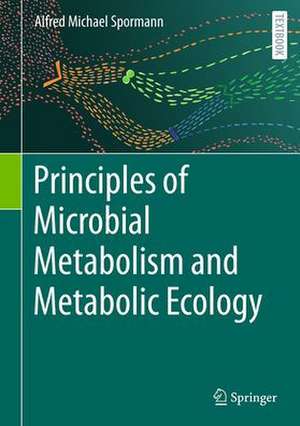Principles of Microbial Metabolism and Metabolic Ecology
Autor Alfred M. Spormannen Limba Engleză Hardback – 2024
Moreover, the book conveys fundamental principles that show students how to approach the field of microbiology from a different, more unifying angle, e.g., how microbes’ access to environmentally available energy resources and the specific metabolism involved lies at the root of every ecologically significant microbial speciation. This aspect, together with its special focus on metabolism and ecological implications, make the book a must-read for all students of microbiology.
Preț: 659.70 lei
Preț vechi: 776.13 lei
-15% Nou
Puncte Express: 990
Preț estimativ în valută:
126.24€ • 130.43$ • 105.01£
126.24€ • 130.43$ • 105.01£
Carte disponibilă
Livrare economică 27 februarie-13 martie
Preluare comenzi: 021 569.72.76
Specificații
ISBN-13: 9783031282171
ISBN-10: 3031282175
Pagini: 338
Ilustrații: XVII, 338 p. 198 illus., 165 illus. in color.
Dimensiuni: 178 x 254 x 26 mm
Greutate: 0.95 kg
Ediția:1st ed. 2023
Editura: Springer International Publishing
Colecția Springer
Locul publicării:Cham, Switzerland
ISBN-10: 3031282175
Pagini: 338
Ilustrații: XVII, 338 p. 198 illus., 165 illus. in color.
Dimensiuni: 178 x 254 x 26 mm
Greutate: 0.95 kg
Ediția:1st ed. 2023
Editura: Springer International Publishing
Colecția Springer
Locul publicării:Cham, Switzerland
Cuprins
Microbial Life on Earth, Metabolism, and Metabolic Diversity.- A Microbe’s Environment and Natural Selection.- Microbial Energetics.- Catabolism and Its Coupling to Anabolism.- Microbial Kinetics.- Mechanisms of Microbial Energy Conservation.- Prototypic Reactions of Prokaryotic Carbon Catabolism.- Metabolic Modules, Pathways, and Nodes of Intermediates.- Fermentative Metabolism.- Prototypic Reactions, Modules, and Pathways of C1 Catabolism.
Notă biografică
Alfred M. Spormann is a microbial physiologist and biochemist, and a Professor at Stanford University. Since his PhD studies with Rolf Thauer, he has been researching microbial metabolism of diverse anaerobic microbes. He joined the faculty at Stanford University in 1994 after postdoctoral work with Harry P. C. Hogenkamp and A. Dale Kaiser, Stanford University. He has been teaching courses in Microbiology, Environmental Microbiology, and Microbial Metabolism for the last 30 years as well as the Woods Hole Microbial Diversity Course for 4 years, and the Hopkins Microbiology Course for 12 years.
Textul de pe ultima copertă
This textbook examines the fundamental principles of microbial metabolism and how a microbe's ecology is intrinsically interwoven with and a consequence of its metabolism. Further, it answers many questions frequently asked by students, such as: What are the mechanistic connections between simple phenotypic traits, ecological patterns and microbial metabolism and diversity? In the process, readers will be introduced to essential topics like metabolism and metabolic pathways, flux of energy and nutrients, genome size and fitness, competition, selection and drift.
Moreover, the book conveys fundamental principles that show students how to approach the field of microbiology from a different, more unifying angle, e.g., how microbes’ access to environmentally available energy resources and the specific metabolism involved lies at the root of every ecologically significant microbial speciation. This aspect, together with its special focus on metabolism and ecological implications, make the book a must-read for all students of microbiology.
Moreover, the book conveys fundamental principles that show students how to approach the field of microbiology from a different, more unifying angle, e.g., how microbes’ access to environmentally available energy resources and the specific metabolism involved lies at the root of every ecologically significant microbial speciation. This aspect, together with its special focus on metabolism and ecological implications, make the book a must-read for all students of microbiology.
Caracteristici
Addresses the need for a systematic introduction to microbial metabolism Provides a particular focus on microbial catabolism Highlights the connection between ecological fitness factors and metabolic pathways in microbes
